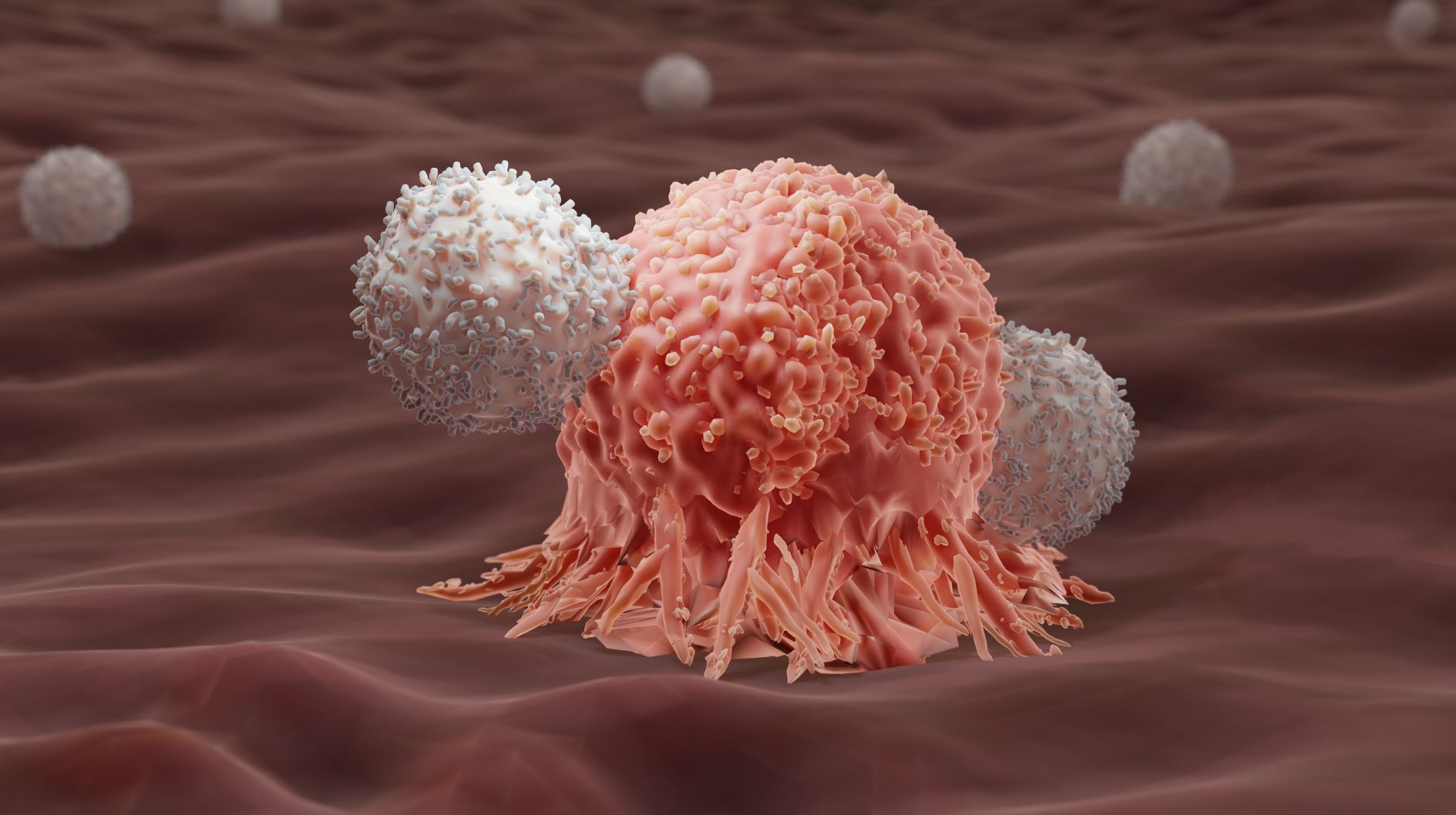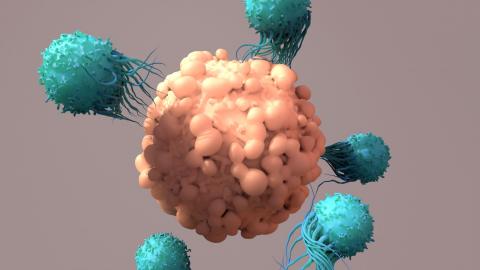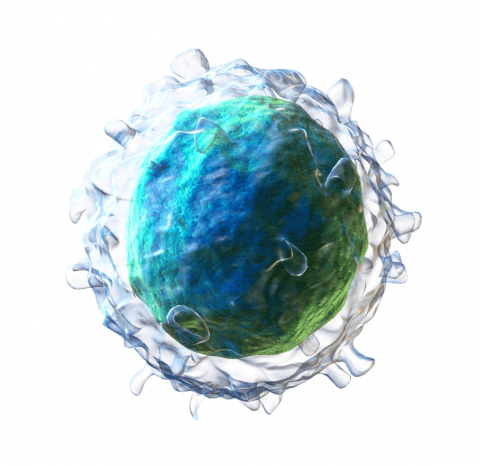Reactions: two studies add circuitry to CAR-T cells to improve immunotherapy
Two preclinical studies published in the journal Science have introduced new bioengineered modifications to CAR-T cells in an attempt to make them more potent and safer in their anti-tumour action. These variations allow their activity to be enhanced only in the vicinity of the tumour or their actions to be regulated on demand.

Melero - circuitos (EN)
Ignacio Melero
Professor of Immunology at the University of Navarra, CIMA researcher and co-director of the Department of Immunology and Immunotherapy at the Clínica Universidad de Navarra.
Estos artículos presentan investigaciones preclínicas extraordinariamente interesantes. Describen la prueba de concepto sobre cómo poner un control remoto a los linfocitos que se utilizan en terapia celular adoptiva. La idea es poder controlar farmacológicamente la expresión de factores que aumentan su función pero que suponen un riesgo, puesto que pueden ser tóxicos.
En uno de los artículos la técnica consiste en controlar la función de genes clave con factores de transcripción artificiales. El diseño se basa en partes de controladores conocidos de la expresión génica, pero se han modificado sus propiedades para hacerlos sensibles a la modulación con fármacos de uso clínico. Se trata un mecano de piezas inteligente y controlable desde el exterior con fármacos para controlar con precisión el nivel de la expresión de algunos genes que son beneficiosos para la función antitumoral. Incluso algunas piezas se han optimizado y cambiado su encaje con genes de interés. Es un precioso ejemplo de virtuosismo tecnológico.
El segundo sistema se basa en receptores de membrana que, al encontrar su ligando, activan un factor de transcripción (proteína que controla en el núcleo la expresión de genes que responden a ese factor de transcripción). Como ejemplo controlan la expresión del gen de la de interleukina-2 y comprueban que, sorprendentemente, funciona mucho mejor en estos sistemas cuando la producen los propios linfocitos T de forma controlada.
These articles present extraordinarily interesting preclinical research. They describe the proof of concept of how to remotely control lymphocytes used in adoptive cell therapy. The idea is to be able to pharmacologically control the expression of factors that enhance their function but pose a risk, as they can be toxic.
In one paper, the technique involves controlling the function of key genes with artificial transcription factors. The design is based on parts of known controllers of gene expression, but their properties have been modified to make them sensitive to modulation by drugs in clinical use. It is an intelligent, externally drug-controllable mechano of parts to precisely control the level of expression of some genes that are beneficial for anti-tumour function. Some parts have even been optimised and re-matched to genes of interest. It is a beautiful example of technological virtuosity.
The second system is based on membrane receptors that, when they find their ligand, activate a transcription factor (a protein that controls the expression of genes in the nucleus that respond to that transcription factor). As an example, they control the expression of the interleukin-2 gene and find that, surprisingly, it works much better in these systems when it is produced by the T cells themselves in a controlled manner.
The experimentally proven concept is very promising. These papers conclude that it can be done. The ideas are patented but the translation to the clinic needs a lot of development and optimisation. The availability of remote pharmacological monitoring is certainly useful. Until now the only thing available in this regard was to put in pharmacologically controlled suicide genes to eliminate CAR lymphocytes if something went terribly wrong in the patient. Modulating function to increase function, but in a controlled way, is one avenue that could lead to effective adoptive cell therapies for solid tumours, taking treatment efficacy beyond haematological tumours (CAR therapies are often effective in the clinic only for leukaemias and B-lymphomas, as well as multiple myeloma).
Vallina - Circuitos (EN))
Luis Álvarez-Vallina
Head of the Clinical Research Unit in Cancer Immunotherapy at CNIO-HMarBCN
The studies have been conducted by two research groups with a long history in synthetic biology and immunotherapy, one led by Wendell A. Lim at the University of California San Francisco and the other led by Ahmad S. Khalil at Boston University. The papers are of excellent quality.
Both papers present synthetic biology-based strategies to improve the efficacy and safety of cell-based cancer immunotherapies, in particular T lymphocytes directed via chimeric antigen receptors (CARs) to predefined tumour targets. Although initially focused on cancer, these approaches could have important future applications in other pathologies. In both cases, the aim is to overcome the physiological limits associated with "natural" immune responses and establish systems that can be regulated, by interactions with specific tumour targets or by drugs, to enhance, regulate or modulate the immune response. These studies will make it possible to extend the efficacy of CAR-T cells in solid tumours, hitherto not very sensitive to this type of therapy, and to improve the toxicity profile of these treatments. In addition, these studies will further develop a concept of great interest in this field, the so-called "dynamic adjustment", which aims to regulate the state of CAR-T cells (active vs. resting) to prevent "cell exhaustion" and enhance anti-tumour responses.
The limitations are those set by tumours, such as clonal heterogeneity, barriers to access to immune infiltration, "brakes" on effector cell functions, etc. I have no doubt that these or similar systems will be the basis for future personalised immunotherapies, which will be equipped with "countermeasures" to counteract the limitations that each tumour may develop.
Manel Juan - Circuitos (EN)
Manel Juan
Head of the Immunology Service
These are two major basic studies that have been partially postulated before, but now provide interesting preclinical data.
They make it possible to propose a more powerful CAR-T strategy, but also other options. The paper by Hui-Shan Li proposes a generic system for defining circuits, and its use in CAR-T would be one of the possible applications.
The study by Greg M. Allen is more specific, defining that with this NOTCH system it is possible to reconstitute synthetic T-cell circuits for an anti-tumour response.
The option for use is clear, but ultimately the most complex step remains to be taken: demonstrating this activity in humans. Clinical trials are ultimately what will tell us whether or not proposals such as these are effective.
"I have no conflicts of interest in this case, beyond the one I have in CAR-T therapy and in treating patients, which may introduce bias into my assessment".
Allen et al.
- Research article
- Peer reviewed
- Experimental study
- Animals
Hui-Shan Li et al.
- Research article
- Peer reviewed
- Experimental study
- Animals



